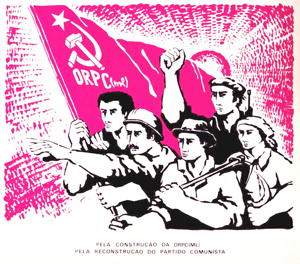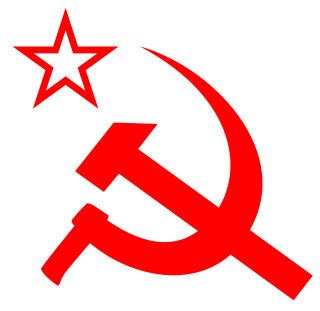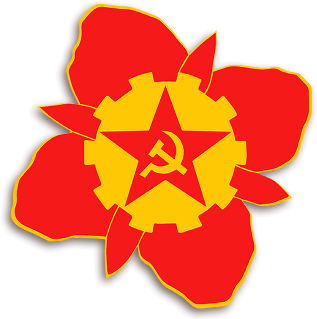
The Portuguese Workers' Communist Party/Re-Organized Movement of the Party of the Proletariat is a Maoist political party in Portugal.

Communist Party of India (Marxist–Leninist) is a communist party in India. The party is one of many working under the name of CPI (ML). The party general secretary was Kanu Sanyal. The name of the party is identical to the original Communist Party of India (Marxist–Leninist) formed in 1969, of which Sanyal was also a key leader, but Sanyal has stated that his party is not the same as this party.

The Party of Labour of Albania (PLA), also referred to as the Albanian Workers' Party (AWP), was the ruling and sole legal party of Albania during the communist period (1945–1991). It was founded on 8 November 1941 as the Communist Party of Albania but changed its name in 1948 following a recommendation by Joseph Stalin. The party was dissolved on 13 June 1991 and succeeded by the Socialist Party of Albania and the new Communist Party of Albania. For most of its existence, the party was dominated by its First Secretary, Enver Hoxha, who was also the de facto leader of Albania from 1944 until his death in 1985.
The Marxist–Leninist Party, USA (MLP) was an anti-revisionist Marxist–Leninist communist party arising out of a series of communist and workers' groups that began in 1967 and lasted until 1993 when it dissolved. It was founded as the American Communist Workers Movement (Marxist–Leninist) in the 1960s as a Maoist organization allied with the Canadian Communist Party of Canada (Marxist–Leninist), CPC (M-L). During its history, it became a Hoxhaist group, before turning away from backing Albania, then rejecting Maoism and subsequently Stalinism as being revisionist. After its dissolution, the majority of its members who remained active formed the Communist Voice Organization. Its main publication was the paper Workers Advocate.
The New Communist movement (NCM) was a diverse left-wing political movement during the 1970s and 1980s in the United States. The NCM were a movement of the New Left that represented a diverse grouping of Marxist–Leninists and Maoists inspired by Cuban, Chinese, and Vietnamese revolutions. This movement emphasized opposition to racism and sexism, solidarity with oppressed peoples of the third-world, and the establishment of socialism by popular revolution. The movement, according to historian and NCM activist Max Elbaum, had an estimated 10,000 cadre members at its peak influence.

The Peruvian Communist Party (Marxist–Leninist) is an anti-revisionist Marxist–Leninist communist party in Peru. It was founded in January 1964 following a split in the Peruvian Communist Party, and was originally known as the Peruvian Communist Party – Red Flag.

The Portuguese Marxist–Leninist Communist Organization was a Portuguese anti-revisionist Marxist–Leninist communist party, founded in 1972 after the merger between two minor communist grouping, the group around the journal O Comunista and O Grito do Povo. The party achieved some political expression in the last years of the fascist regime of Marcello Caetano, mainly in Paris, among a community of exiled politicians.

The Popular Democratic Union is a Marxist political movement in Portugal. The UDP transformed itself into a political association at its 15th congress due to its merger with other left-wing parties in the Left Bloc.

Organization for the Reconstruction of the Communist Party (Marxist–Leninist) was a communist group in Portugal led by Francisco Martins Rodrigues. ORPC(ML) was formed in 1975.

Portuguese Marxist–Leninist Committee was an anti-revisionist Marxist–Leninist communist party in Portugal. CM-LP was formed in March 1964 by a group led by Francisco Martins Rodrigues. Martins, who was a Central Committee Member of the Portuguese Communist Party, had split from PCP in January the same year. CM-LP was formed after the formation of the Popular Action Front, which existed parallel to CM-LP.CM-LP published Revolução Popular.

The Communist Party of Portugal (Marxist–Leninist) was an anti-revisionist Marxist-Leninist communist party in Portugal. Also known as the 'Mendes faction of PCP(M-L)'.

Communist Union for the Reconstruction of the Party (marxist-leninist) was a communist group in Portugal led by Afonso Gonçalves da Rocha. UCRP (ml) was founded in 1975 after a split from the Portuguese Marxist-Leninist Communist Organization (OCMLP).
Communist Party (Reconstructed) (Portuguese: Partido Comunista Português (reconstruído)), initially known as Portuguese Communist Party (Reconstructed) (Portuguese: Partido Comunista Português (Reconstruído)), was a political party in Portugal.
The Marxistisk-Leninistisk Enhedsforbund or MLE was a Marxist-Leninist political party in Denmark which existed from 1972 until 1975.

The Communist Party of Turkey/Marxist–Leninist is a Marxist–Leninist–Maoist insurgent organization in Turkey involved in the Maoist military strategy of people's war against the Turkish government. It was founded in 1972 by a group of former members of the Revolutionary Workers and Peasants Party of Turkey (RWPPT), organised by İbrahim Kaypakkaya as TKP (M-L), who wished to carry out armed struggle.

The Communist Party of Canada (Marxist–Leninist) is a federal political party in Canada. It was founded in 1970 by Hardial Bains, a staunch Stalinist and anti-revisionist. The CPC (M-L) has been registered with Elections Canada as the Marxist–Leninist Party of Canada (MLPC) since 1974, as the party is prohibited from using the name "Communist Party of Canada" in Canadian elections to avoid confusion among voters. The party is not an offshoot of the Communist Party of Canada; its early membership came from student-led organizations active in the 1960s. After a period of alignment with Maoism and China, the CPC (M-L) pursued a Hoxhaist, pro-Albanian line until the early 1990s. At present, the party directs most of its public support to Cuba and North Korea.
Marxism–Leninism–Maoism (MLM), also known as Marxism–Leninism–Mao Zedong Thought, is a political philosophy that synthesizes and builds upon Marxism–Leninism and the thought of Mao Zedong. Marxism–Leninism–Maoism was first formalized by the Shining Path in 1982.
The International Conference of Marxist–Leninist Parties and Organizations (ICMLPO) was an international grouping of political parties and organizations adhering to Mao Zedong Thought founded in 1998 by the Marxist-Leninist Party of Germany. It was organized by a Joint Coordination Group and met every two or three years. It ceased to exist in 2017.












